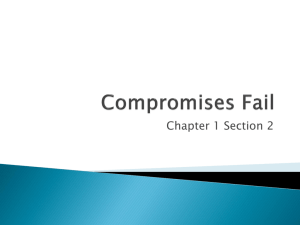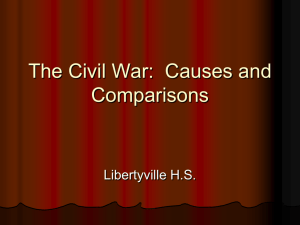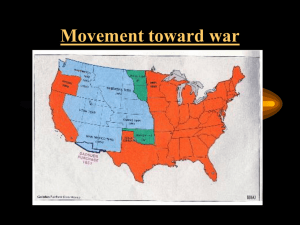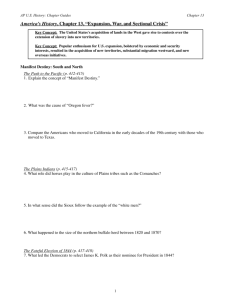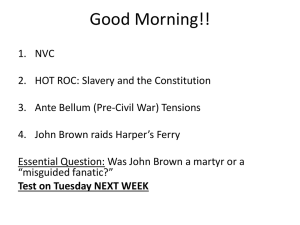10.1 – Growing Tension Over Slavery
advertisement
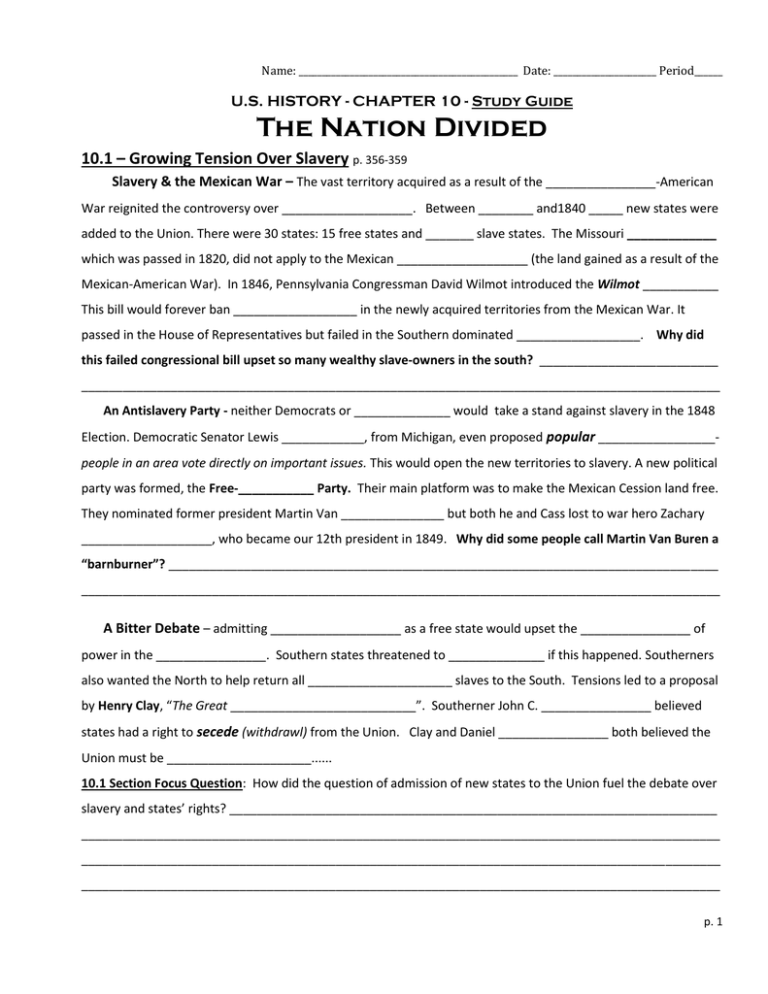
Name: _______________________________________________ Date: ______________________ Period______ U.S. HISTORY - CHAPTER 10 - Study Guide The Nation Divided 10.1 – Growing Tension Over Slavery p. 356-359 Slavery & the Mexican War – The vast territory acquired as a result of the ________________-American War reignited the controversy over ___________________. Between ________ and1840 _____ new states were added to the Union. There were 30 states: 15 free states and _______ slave states. The Missouri _____________ which was passed in 1820, did not apply to the Mexican ___________________ (the land gained as a result of the Mexican-American War). In 1846, Pennsylvania Congressman David Wilmot introduced the Wilmot ___________ This bill would forever ban __________________ in the newly acquired territories from the Mexican War. It passed in the House of Representatives but failed in the Southern dominated __________________. Why did this failed congressional bill upset so many wealthy slave-owners in the south? __________________________ _____________________________________________________________________________________________ An Antislavery Party - neither Democrats or ______________ would take a stand against slavery in the 1848 Election. Democratic Senator Lewis ____________, from Michigan, even proposed popular _________________people in an area vote directly on important issues. This would open the new territories to slavery. A new political party was formed, the Free-___________ Party. Their main platform was to make the Mexican Cession land free. They nominated former president Martin Van _______________ but both he and Cass lost to war hero Zachary ___________________, who became our 12th president in 1849. Why did some people call Martin Van Buren a “barnburner”? ________________________________________________________________________________ _____________________________________________________________________________________________ A Bitter Debate – admitting ___________________ as a free state would upset the ________________ of power in the ________________. Southern states threatened to ______________ if this happened. Southerners also wanted the North to help return all _____________________ slaves to the South. Tensions led to a proposal by Henry Clay, “The Great ___________________________”. Southerner John C. ________________ believed states had a right to secede (withdrawl) from the Union. Clay and Daniel ________________ both believed the Union must be _____________________...... 10.1 Section Focus Question: How did the question of admission of new states to the Union fuel the debate over slavery and states’ rights? _______________________________________________________________________ _____________________________________________________________________________________________ _____________________________________________________________________________________________ _____________________________________________________________________________________________ p. 1 10.2 – Compromises Fail p. 362-367 In July of 1850, President Zachary _________________ suddenly died in office. He had opposed the “Compromise of ___________”. Vice-president Millard __________________ became president #13. He disagreed with Taylor about Henry Clay’s compromise. One of his first acts as president was to sign The ___________________ of 1850. The Compromise of 1850 – was a bundle of 5 bills that were designed to do what? ___________________ _____________________________________________________________________________________________ Describe each of the 5 bills and which states (if any) that it benefits: Bill favors: 1. ________________ becomes the 31st state, a ___________ state ____________ 2. New ________________ will have no restrictions on _______________ ____________ 3. Texas/New ________________ border settled ____________ 4. Slaves could no longer be SOLD in _______________________ D.C. ____________ 5. The ________________ Slave Act: requires all runaway slaves be returned ____________ The Fugitive Slave Act – Southerners _____________ this part of the Compromise. Had four parts: 1. ___________________ runaway slaves could be arrested. 2. The __________________ had NO right to a ________________. 3. Only needed word of 1 __________ person to arrest an accused runaway slave. 4. Northerners were _________________ to help capture runaways. Many northerners were ____________________ by this law which resulted in many ________ African-Americans being sent South and __________________ into slavery. In Northern cities, communites banded together to _____________________ the Fugitive Slave Act. More northerners began to believe that slavery is ___________. Uncle Tom’s Cabin – Anger over the Fugitive Slave Act led Harriet Beecher ______________ to write the antislavery novel Uncle ___________ Cabin. Her novel became a world-wide best seller in 1852. Stowe was the daughter of an ________________________ minister. She witnessed the cruel treatment of slaves when she visited ___________________. Her novel caused thousands of people to question the ____________________ of slavery. Southern states considered her book to be propaganda (false or _____________________ information). Uncle Tom’s Cabin was ___________________ in many Southern states. Franklin Pierce – President #14 easily defeats Millard Fillmore in 1852 election. “Handsome Frank” was liked by _______________________ when he became president, will be ________________ by most when he is done. His presidency was weakened by the tragic death of his only son in a __________________ wreck. He will be bullied by Senator Stephen _____________________ into signing the Kansas - ______________________ Act. Stephen Douglas – the senator from Illinois wanted to see the _________________-Nebraska Territories developed. He stood to personally _________________ from a _____________________ built through Illinois. p. 2 Name: _______________________________________________ Date: ______________________ Period______ CHAPTER 10 - Study Guide – The Nation Divided (Continued) The railroad through Illinois would require support of __________________ senators. Douglas knew he could get this by offering them the ___________________ - Nebraska Act. This law allowed settlers in the territories to decide whether their territory would allow ________________ by offering _______________ ________________ -the idea that people living in the territories could decide for themselves if their state would allow slavery. The effect of this controversial Act was to overturn the _______________________ Compromise. It would lead to… Bleeding Kansas - Kansas suffered widespread ___________________ as proslavery and antislavery settlers battled for control. QUESTION: Who would have moved to the Kansas Territory before the Kansas-Nebraska Act, people who were for OR against slavery? _______________________________ After the KS/NB Act, pro-slavery supporters moved into Kansas to ______________________ vote for a proslavery government. This lead to years of violence and inspired abolitionist John __________________ to join the fight. In 1856, Brown and his followers butchered 5 proslavery settlers at Pottawatomie Creek in retaliation for their sacking _______________________, the antislavery capital of Kansas. Brown’s attack was preceded by the beating of Charles ____________________, an abolitionist senator from ____________________________. 10.3 – The Crisis Deepens p. 368-372 A New Antislavery Party – in 1854, the ____________ party splits. Members of the Free-__________ and Whig parties started a new anti-slavery party: The _________________________ Party. Their main platform was to STOP the _________________ of slavery into the western territories. The first Republican candidate for president was John C. ______________________. He did well by taking _____ of the 16 Free states in the election of 1856. However, he lost to the Democrat, James _____________________________ from Pennsylvania. The Dred Scott Decision – a slave named Dred __________________ was taken by his owner from a slave state to a free state, where he lived for five years. When they returned to the slave state, Mr. Scott _________ for his freedom. The case was ultimately decided by the ______________________ Court in 1857. In a sweeping ruling, Chief Justice Roger B. __________________ & the Supreme Court concluded the following: 1.) Blacks were not ______________________, 2.) Slaves were _______________________, and 3.) ______________________ cannot decide slavery for states or territories. QUESTION: What did the ruling that slaves are property mean for free states? ___________________________________________________________________________________ Reaction to these rulings varied by region. Southern leaders happy that slavery was now _____________in _____ territories. Northerners were ______________________ and outraged. The Lincoln-Douglas Debates - Abraham Lincoln took a strong stand against slavery’s _________________ while running for the _________________ against Stephen Douglas in 1858. They held a famous series of debates p. 3 while campaigning though Illinois. Their speeches were printed throughout the country. Lincoln’s memorable “House-___________________” speech made it clear that he saw no future for ___________________ in the U.S. John Brown’s Raid – Brown was a fanatical __________________________ from the Northeast. In 1856, he attacked and ___________________ proslavery settlers during “Bleeding _________________”. In 1859, he led 22 men to attack the Federal Armory in Harpers Ferry, VA to get weapons to start a _______________ rebellion. He was injured and captured by the U.S. Army, tried & executed for _________________. YOUR TURN: Was John Brown a hero or a terrorist (or both)? Explain in 2-3 sentences: _________________________________________ _____________________________________________________________________________________________ _____________________________________________________________________________________________ _____________________________________________________________________________________________ 10.4 – The Coming of the Civil War p. 373-377 The Nation Divides – The election of _________ led to the breakup of the Union. The ________________ Party split into northern and ___________________ sections. Democrats in the north nominated Stephen _____________________ while southern Democrats chose John C. ___________________________ to run for president against John ____________ of Tennessee and the Constitutional Union Party and Abraham Lincoln, who was the _________________________ nominee. Lincoln was VERY unpopular in the south because he opposed the _______________ of slavery and favored protective ___________________. Lincoln wins the election of 1860 without even getting 40% of the ___________________ vote. How? ____________________________________ Lincoln's victory causes southern states to _________________. They believed he was against them. The first state to secede was South ________________________, on Dec. 20, 1860. Six other states secede soon after to form the ____________________________ States of ______________________ (the C.S.A.). The 1st seven states of the Confederacy were: South Carolina, Mississippi, ____________________, Alabama, ___________________, Louisiana, and ___________________. Their representatives met in Montgomery, ____________________ where they formed a __________________________, began training an _____________, and elected Jefferson________ to be their president. All of this happened before Abraham Lincoln actually became _______________________. The Civil War Begins – at his inauguration, President Lincoln made three promises to the nation (and the South). 1.) He would NOT interfere with slavery where it ____________________ existed. 2.) He would enforce the ____________________ _____________ Law. 3.) He would NOT allow any further extension of ___________ His efforts to heal the division were ignored by the South. On April 12, 1861, South Carolina militia fired the first shots of the Civil War as they bombarded federal troops in Fort ___________________, a small fort in the mouth of the Charleston Bay, in _________________________, South _________________________. The Civil War had begun. p. 4 Name: _______________________________________________ Date: ______________________ Period______ p. 5 CHAPTER 10 - Study Guide – The Nation Divided (Continued) Use your knowledge, study guide, and textbook to complete the following: p. 6

